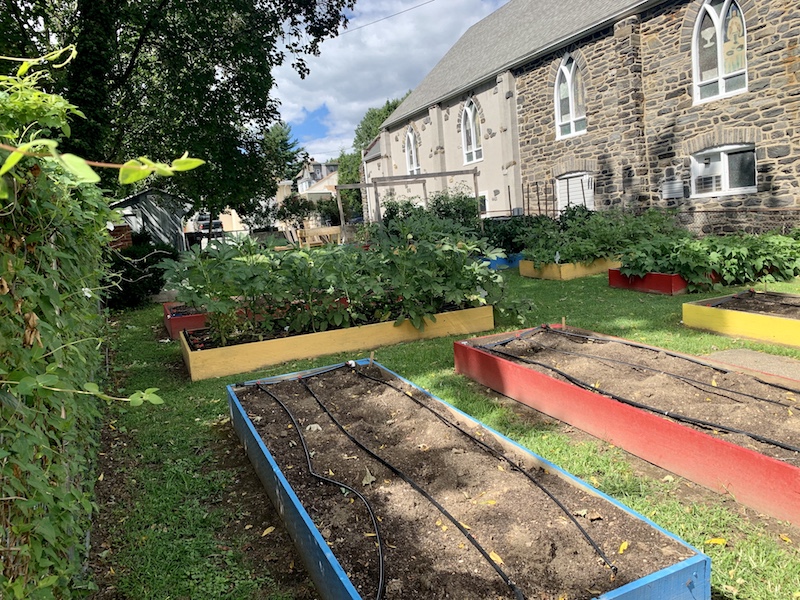Church Grows a Solution to a Hidden Need
Church Grows a Solution to a Hidden Need
By Ray Marcano
Se pueden leer la traducción en español aquí (Read this story in Spanish)
In 2018, the Bethel A.M.E Church of Ardmore in Lower Merian, PA met with Trellis for Tomorrow, a non-profit with expertise in organic farming. The church and Trellis partnered to tackle an inconspicuous problem in one of the state’s wealthiest townships.
Food insecurity.
The Rev. Carolyn Cavaness, Bethel’s pastor, knew that some families would have difficulty feeding their children during the summer months since 10% of the community’s students relied on free or reduced meals at school. Partnering with Trellis, she created The Bethel AME Church Community Garden and Ardmore Victory Gardens, which provides free, fresh produce for anyone who needs it.
The garden started on church property with one bed and now, five years later, has 15 that produced 1,200 pounds of food in 2022, according to its annual report. The program has helped build 50 garden beds for local families and organizations. The garden operation is now so large it’s hired a full-time staffer to supplement the program’s 50 current volunteers and has a budget of $75,000.
Cavaness called Trellis “the project’s architect” because it had the expertise to get the program off the ground. Building garden beds isn’t as simple as putting seeds in the ground. Cavaness learned which crops would thrive in the northeast, what type of irrigation system would be best for her crops, whether the beds should be in direct sunlight, and much more. Today, Ardmore Victory Gardens uses their newfound skills to help people in the community with questions about their gardens — such as, what kind of fence best keeps out squirrels.
In addition to learning the ins and outs of gardening, Cavaness had two other issues to confront. She had to convince her 125-member congregation of the project’s overall benefit, and village residents that people were going hungry in their affluent community.
Some congregation members saw a risky project with no direct benefit to the church and worried about the cost. The water bill might increase, some said. The effort may divert focus from other projects. But Cavaness said she doesn’t use church funds and received grants and other contributions to keep the garden growing.
Cavaness also experienced some skepticism because Lower Merian is one of the wealthiest townships in the state, with a median annual household income of nearly $149,000. If you live here, how could you not afford food, Cavaness would hear. But she had a simple message: “This is real. This is in our neighborhoods,” she said.
The skepticism has faded. Now, the Victory Garden project has grown into a community staple with festivals, lectures, and workshops, all around themes of food insecurity, empowerment and justice, and how these gardens can help make people become self-sufficient.
The project helps other churches build beds on their property and provide seed for people who need it. The program also serves as support for people of color interested in agriculture. It hosted a webinar with the Black Church Food Security Network, which empowers Black churches with land to grow food. In conjunction with one of its partners, Haverfarm, it hosted Amirah Mitchell of Sistah Seeds, which educated Black and brown growers on culturally important seeds.
The AME Church was founded on principles of self-help and self-determination. “This is core of being self-sufficient,” and meets the church’s mission and values, Cavaness said. “We took care of ourselves, each other, and the community at large. If somebody needs it, we have it here.”
This story is part of Lake Institute’s story collection, the Faithful Generosity Story Shelf, which highlights congregations and other religious organizations who have sought to use their assets and resources in creative—and sometimes surprising—ways as an expression of faithful giving.
Each entry in our Story Shelf is short enough to be read and discussed during a committee meeting or other group gathering. Our hope is that these accessible vignettes will spark new questions, conversation, and imagination among clergy and laity about what might be possible with the funds, buildings, land, and other resources in their care. If you know a story that should be included in the Story Shelf, suggest it here.
Subscribe
Insights is a bi-weekly e-newsletter for the religious community and fundraisers of faith-based organizations that provides:
- Reflections on important developments in the field of faith and giving
- Recommended books, studies and articles
- Upcoming Lake Institute events

